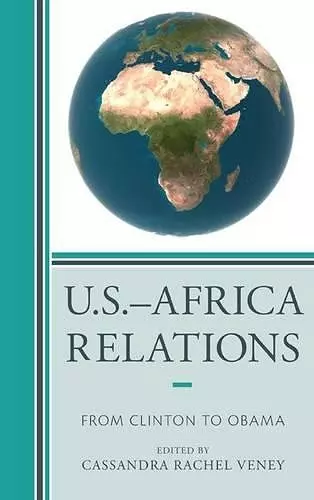U.S.–Africa Relations
From Clinton to Obama
Format:Hardback
Publisher:Lexington Books
Published:17th Jun '14
Currently unavailable, and unfortunately no date known when it will be back
This hardback is available in another edition too:
- Paperback£42.00(9780739195819)

U.S.–Africa Relations: From Clinton to Obama is an examination and analysis of U.S.–Africa relations during the Clinton, George W. Bush, and Obama administrations. It covers the entire continent with an inclusion of the Democratic Republic of the Congo (DRC), Nigeria, South Africa, Ethiopia, Egypt, Libya, Tunisia, Uganda, and Rwanda. Some of the issues addressed in the analysis include the militarization of Africa within the context of the war on terror and the creation of the Africa Command; the Arab Spring and questions concerning the U.S. role in Egypt, Tunisia, and Libya; the Great Lakes region and the role or lack thereof of the United States, beginning with a discussion of U.S. support for various leaders from Mobutu (DRC) to Kabila (DRC) to Kagame (Rwanda), and Museveni (Uganda) who did and do not act in accordance with the U.S. policy of encouraging democracy. The role of Africans in U.S.–Africa relations is examined in the book. For example, many African leaders expressed their disapproval of the creation of the Africa Command, and African leaders refused to have it housed on their soil. The book discusses how African leaders and Africans can work with the United States to encourage economic development by establishing and upholding the rule of law, respecting human rights, and creating and maintaining transparency in the government and business activities. The role of African-descended people in U.S.–Africa relations is also addressed in terms of African American celebrities, scholars, and businesspeople. In sum, it appears on the surface that the United States has become more involved in African affairs due to new post–Cold War realities—it is the only remaining superpower; the war on terror extends to Africa; more Africans have migrated to the United States; and trade relations have deepened due to the Africa Growth and Opportunity Act and the need to import oil and gas from various African countries. At the same time, the U.S. policy has not veered far from national security interests and the promotion of democracy regardless of who is in the White House.
[The] author’s incisive interpretative repertoire . . . gives the book a multilayered texture that is intriguing and puts it above standard narratives about the Liberian civil war and its dehumanizing violence. . . .While specialists of violence and its effects on society will find it easier to relate to the book’s subject matter for obvious reasons, non-specialists will also be pleasantly surprised by the ease with which they can follow Abramowitz’s complex thought process that seldom wavers in its attempt to reenact the chaotic nature of a dysfunctional Liberian society reemerging from its troubled war-torn recent past. * African Studies Quarterly *
ISBN: 9780739190036
Dimensions: 233mm x 162mm x 21mm
Weight: 467g
226 pages